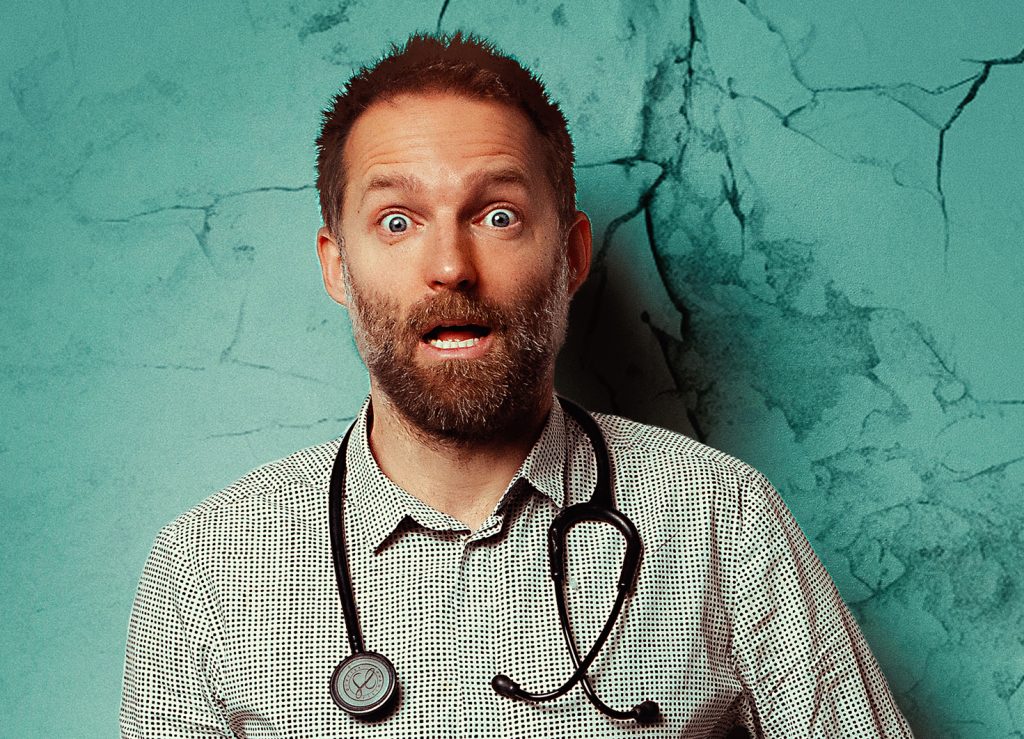Interview – Benji Waterhouse

We are delighted that our latest interview is with NHS psychiatrist, writer and stand up comedian Benji Waterhouse, who will be bringing his You Don’t Have To Be Mad To Work Here Book Tour to the Leadmill on 11 May (book your tickets here).
Q. Tell us about yourself, including how you came to become an NHS psychiatrist and now a writer and stand up comedian?
A. I’m Benji a psychiatrist and writer. I became a psychiatrist after realising at medical school I was more interested in the mind than the body. I started doing stand-up around the time to helps find some lightness the amongst the darkness. The NHS often runs on gallows humour. Along with strong tea.
Q. What can we expect from your first book tour?
A, It will be a combination of storytelling, stand-up and an audience Q&A (your best chance to speak to an NHS psychiatrist without the 12 month waiting list).
Q. What are you looking forward to about bringing your tour to Sheffield?
A. I always love coming to Yorkshire as lots of my family or originate from Settle and York. I also went to Leeds Medical School whose most famous alumnus is Harold Shipman. The only good thing about having the UK’s most prolific serial killer as a former student was at least at my medical school interview I knew that if I didn’t get in I could always tell myself ‘they’re not always the best judge of character’. One of my younger brother’s is a jeweller lives in Sheffield and whenever I visit we always go to The Leadmill, which puts on great shows.
Q. Is there an average audience for your shows and do they ever bring their psychiatric issues with them for you to solve there and then?
A. My audience is usually made up of people who use the NHS and those who work in it. One occupational hazard of this is that after my shows NHS workers try to give me their jokes. Once after a show a surgeon said to me ‘I’ve got one for you’. He told me he’d been examining a man’s prostate and said he warned the patient that a side effect of a finger up the bottom can be an unwanted an erection. The patient said he didn’t think that would happen to him which prompted this surgeon to apparently quip: ‘Oh I’m not talking about you’. Then he said to me “you can use that one if you want?” I decided I’d rather keep my fitness to practice.
Q. You were including in a list of inspirational psychiatrists, which psychiatrists and comedians inspire you?
A. My favourite comedian’s are the brutally honest ones like Simon Amstell. I admire psychiatrists who put human rights above the fears of society – people like the French physician Philippe Pinel who first had the novel idea of treating asylum patients humanely and unlocking them from their chains.
Q. If you could clear up any myths about psychiatry and mental health what would they be?
A. Society still has lots of misconceptions about severe mental illness and words like ’schizophrenia’ usually have bloody connotations for the general public, partly because we only ever hear about it on the rare occasion that things have gone very wrong. But in reality most people with that diagnosis with never be violent and are more likely to be victims of violence than perpetrators of it. Alcohol and drugs are a far bigger risk factor for homicide than schizophrenia is, so I’m actually technically safer being in a psychiatric patient’s home than and I am at a psychiatrist’s house party.
Q. If you were the Minister of Health what changes would you make to improvement treatment of mental health in the UK?
A. There’s a saying in medicine that prevention is better than cure. Which is especially true in psychiatry since we don’t really have any cues. So if I were the Ministry of Health I would invest more in prevention strategies. If we properly addressed poverty, inequality, lack of education, unemployment, loneliness, racism, substance misuse problems and so on, than a lot of the things we end up later calling mental health problems wouldn’t present in the first place.
Q. And finally, Ben Whishaw played Adam Kay in the television adaptation of his book and the television rights to your book have been sold so if you could have anyone play you in a screen adaptation of yours who would you choose and why?
A. If we had an unlimited budget, I think Timothée Chalamet could really capture the exhausted, mildly traumatised, hasn’t-eaten-properly-in-a-week look.